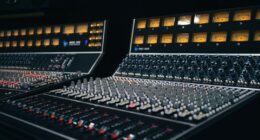In the music business, partnerships have always been important. Artists have long understood the power of collaborating to create something special & memorable, as evidenced by legendary duets and genre-bending partnerships. Collaborations, though, are not exclusive to the music industry. Artists and businesses have been working together to create mutually beneficial partnerships in a trend known as brand collaborations.
Key Takeaways
- Collaborations between music and brands can be powerful marketing tools.
- Harmonious brand collaborations can benefit artists by providing exposure and financial support.
- Music marketing is crucial in successful brand collaborations.
- Branding plays a significant role in music marketing and can enhance the artist’s image.
- Social media has a significant impact on brand collaborations in music, and it’s essential to consider when planning collaborations.
The idea behind brand partnerships in music is straightforward but effective. Artists who collaborate with brands can reach a wider audience and market, experience more exposure and visibility, and have more chances to explore & express their creativity. However, companies can use the artist’s popularity and reach to improve their brand perception, establish a stronger connection with customers, and eventually increase sales. The increased exposure and visibility that artists receive from brand collaborations is one of the main advantages. Artists can expand their audience & gain access to the brand’s current customer base by partnering with a well-known company. A rise in their career may result from this exposure, which may also bring in more sales, streaming, and new fans.
Also, artists can reach new markets & audiences through brand collaborations. Artists can broaden their audience and establish a connection with fans they might not have otherwise encountered by collaborating with a brand that caters to a distinct target demographic or market segment. Increased tour dates, merchandise sales, and an all-around increase in their fan base can result from this.
Artists can express themselves creatively and try new things through brand collaborations. Artists who collaborate with brands have the opportunity to delve into uncharted territories such as innovative concepts, genres, and styles that they might not have had the opportunity to investigate independently. This can result in artistic development and the capacity to push boundaries, which will ultimately draw in new followers and maintain the interest of current ones.
| Collaboration | Artists Involved | Genre | Success Metrics |
|---|---|---|---|
| Despacito | Luis Fonsi, Daddy Yankee, Justin Bieber | Latin Pop, Reggaeton | Most streamed song of all time, 7x Platinum certification |
| Shallow | Lady Gaga, Bradley Cooper | Pop, Country | Academy Award for Best Original Song, 4x Platinum certification |
| Don’t Start Now | Dua Lipa, Ian Kirkpatrick | Pop, Disco | Grammy nomination for Record of the Year, 3x Platinum certification |
| Blinding Lights | The Weeknd, Max Martin | Pop, Synthwave | Billboard Hot 100 #1 for 4 weeks, 8x Platinum certification |
And last, through sponsorships and endorsements, brand partnerships may yield financial benefits for artists. Through brand partnerships, artists can obtain profitable sponsorship agreements, endorsement contracts, and licensing opportunities. This can offer a reliable source of income & financial security, freeing artists from the continual worry of money problems so they can concentrate on their work. Although artists can benefit greatly from brand collaborations, these alliances frequently hinge on successful music marketing. Enhancing brand collaborations is a key function of music marketing, which is the strategic positioning and promotion of music to target audiences.
Customers can connect emotionally with music in a way that is distinct from other mediums. It has the capacity to bring back memories, arouse feelings, & forge an identity. Companies can take advantage of these emotional ties and forge closer ties with customers by integrating music into brand collaborations. Positive brand associations, heightened brand loyalty, and eventually higher sales can result from this. Carefully choosing songs that fit the brand’s values, target demographic, and overall marketing goals is often a key component of successful music marketing initiatives.
Brands can make a strong emotional connection with customers by selecting the right music, which increases the likelihood that they will interact with the brand and make a purchase. Numerous companies have used music marketing to improve their brand partnerships with success. As an illustration, Apple and U2’s collaboration to offer the album “Songs of Innocence” to all iTunes customers for free produced a tremendous amount of buzz and millions of downloads. This partnership improved Apple’s reputation as a champion of innovation and music while also raising awareness of U2.
Enhancing brand collaborations in the music industry requires not only music marketing but also branding. Marketing initiatives for music can be greatly aided by branding, which is the process of giving a business or product a distinctive & identifiable identity. The reason branding matters is that it fosters authenticity and consistency in brands. A true partnership that reflects the values of the brand and the artist is crucial when artists work with brands.
Consumer trust can be developed and a positive brand image can be formed by brands that uphold authenticity and consistency. Developing a distinctive brand narrative, a strong visual identity, and consistent messaging are frequently necessary for successful branding in the music business. Artists and brands can establish a distinctive and identifiable presence in the market, which facilitates consumer recall and connection, by creating a unified brand identity.
A number of brands have effectively employed branding strategies to augment their music marketing initiatives. For instance, the success of Nike’s collaborations with different artists, like Travis Scott and Kanye West, can be attributed to the brand’s persistent emphasis on innovation, athleticism, and empowerment. Nike has become strongly associated with music and culture thanks to its consistent branding, which has made it a preferred brand for both consumers and artists.
The way that brands and musicians work together in the music business has been transformed by social media. It has given brands and artists new ways to interact with fans, publicize their partnerships, and produce interesting content. Because social media allows for direct communication between musicians, brands, and fans, it has completely changed the landscape of music-related brand collaborations. In addition to sharing behind-the-scenes content & promoting collaborations directly to their followers, artists can now engage in real-time communication with their fans.
In the end, this kind of interaction & openness can foster a feeling of genuineness and devotion among followers, which is advantageous for the brand as well as the artist. Social media marketing does, however, present certain difficulties. Because social media moves quickly, in order to remain relevant, brands and artists must continuously produce unique and captivating content. Further complicating matters for brands seeking to leave a lasting impression is the proliferation of influencer marketing. Crafting a thoughtful social media strategy that fits in with their overall marketing goals & appeals to their target demographic is imperative for brands and artists.
Numerous brands have effectively leveraged social media platforms to endorse their musical collaborations. One Coca-Cola campaign that encouraged fans to share their experiences with the beverage on social media was “Share a Coke,” which featured personalized bottles with people’s names on them. Along with producing millions of social media posts, this campaign helped fans feel connected to one another & as a community, which improved Coca-Cola’s reputation worldwide. Musicians and brands should be aware of certain dos and don’ts in order to ensure a successful partnership, even though these kinds of partnerships can be very advantageous.
A crucial pointer for fruitful brand partnerships in the music industry is to make sure the alliance feels genuine & is in line with the brand’s and the artist’s core principles. Customers are more perceptive than ever and can tell when a partnership seems forced or unnatural. Artists and brands can establish a partnership that feels organic and resonates with consumers by choosing partners who have a genuine connection and share similar values. Another piece of advice is to spell out the goals and expectations of the partnership right away.
It is important for both sides to be crystal clear about their goals & how they plan to evaluate their progress. This will make it more likely that there will be a win-win partnership and that both sides will be pursuing the same objective. However, when starting a brand collaboration, there are a few typical blunders that brands and artists should stay away from. Prioritizing financial gain over artistic integrity is a prevalent mistake. Profit is obviously important, but it shouldn’t come at the price of the artist’s originality or the authenticity of the brand.
Artists and brands should make sure that a collaboration is in line with their overall goals and values by carefully weighing the long-term implications of doing so. The value of open communication & teamwork between the brand & the artist is something else that is frequently overlooked. To make sure the partnership lives up to their expectations and appeals to their target market, both parties should actively participate in its conception and implementation. Effective communication and teamwork can prevent misunderstandings, guarantee a seamless partnership, and eventually result in a fruitful collaboration. The music business has seen a number of unsuccessful brand partnerships.
Kendall Jenner and Pepsi’s partnership is one noteworthy instance. The commercial, which showed Jenner participating in a protest and giving a police officer a can of Pepsi, drew harsh criticism for trivializing social justice movements and using activism for profit. Due to its lack of authenticity and disregard for the social & cultural context of its release, this collaboration was a failure. Let’s examine a few more successful case studies to highlight the effectiveness of brand partnerships in the music industry.
The cooperation between Beyoncé and Pepsi is one instance of a fruitful brand partnership in the music industry. A limited-edition Pepsi can with Beyoncé’s image, a sponsorship deal for her world tour, and a series of commercials were all products of the multi-year collaboration. Because it reflected the empowerment, creativity, & innovation values shared by Pepsi & Beyoncé, this partnership was a success. Also, Beyoncé gained more notoriety & financial benefit from it, & Pepsi gained from being associated with one of the biggest names in music. Diet Coke and Taylor Swift’s partnership is another example of a successful brand collaboration in the music industry.
The partnership enhanced Diet Coke’s brand image as an advocate for music and creativity and helped it connect with a younger audience through a series of commercials, social media campaigns, and exclusive content. This partnership was a success because it made use of Taylor Swift’s enormous social media following and fan base to generate conversation and interaction. As the music industry develops, brand partnerships also follow suit. In order to stay ahead of the curve, artists & brands need to be aware of a few emerging trends. The popularity of live streaming and virtual concerts is one new trend.
Thanks to technology, musicians can now interact with fans worldwide and perform live. With the ability to sponsor virtual concerts, develop interactive experiences, and interact in real time with fans, this creates new avenues for brand collaboration. In addition to giving performers a new source of income, virtual concerts allow them to perform in front of a worldwide audience without being limited by physical locations. Augmented reality (AR) and virtual reality (VR) combined in brand partnerships is another new trend. By blending the boundaries between the real & virtual worlds, brands can provide customers with immersive and interactive experiences thanks to AR and VR technologies. Through the integration of augmented reality and virtual reality in brand partnerships, artists and brands can craft distinctive and unforgettable experiences that captivate customers and create a lasting impact.
The future of brand collaborations in the music industry is also being shaped by the development of artificial intelligence (AI) and data analytics. Being able to gather and examine enormous volumes of data allows brands to learn important things about the preferences, trends, & behavior of their customers. Customized experiences, strategic alliances, and marketing campaigns with a specific focus can all be developed using this data. Also, AI technologies can automate and optimize marketing campaigns, enabling companies to send the right message to the right audience at the right moment. Determining the return on investment (ROI) and making wise decisions for future partnerships require measuring the success of brand collaborations in the music industry.
Artists and brands can monitor a number of important metrics to gauge the effectiveness of their partnerships. The growth in exposure and visibility is a crucial indicator to monitor. Metrics like social media impressions, website traffic, and media coverage can be used to gauge this. Through the monitoring of these metrics, brands and artists can ascertain the extent & influence of their joint ventures and pinpoint opportunities for enhancement. An additional crucial metric to monitor is the rise in fan interaction.
Metrics like likes, comments, & shares on social media, along with streaming and sales data, can be used to gauge this. Artists & brands can monitor these metrics to figure out how engaged fans are with their work & how their collaborations affect fan behavior. The measurement of financial gain is also crucial. Metrics like merchandise sales, endorsement agreements, sponsorship deals, and streaming & sales revenue can be used to gauge this.
Through monitoring these indicators, brands and artists can evaluate the overall success of their partnership as well as the financial impact of their collaborations. Ultimately, brand-music partnerships have a lot to offer both companies and musicians. Artists who collaborate have the potential to secure more financial support through sponsorships and endorsements, reach new audiences & markets, express themselves creatively and experiment more freely, and become more visible & visible. On the other side, brands can use the artist’s reach and influence to improve their brand image, establish a stronger connection with customers, & eventually increase sales.
Effective music marketing techniques as well as brand authenticity and consistency are critical for maximizing the benefits of brand collaborations in the music industry. Through the strategic use of music & branding, musicians & companies can establish strong emotional bonds with their fan base, foster a sense of trust & loyalty, & ultimately accomplish their marketing goals. It is essential for musicians and brands to stay ahead of the curve & embrace new trends as the music industry continues to change.
Future innovative brand collaborations have a plethora of opportunities, ranging from live streaming and virtual concerts to augmented reality and data analytics. Artists & brands can make educated decisions & continuously improve their collaborations by evaluating the success of their partnerships using critical metrics like exposure, engagement, & financial gain. To sum up, brand partnerships in the music industry have the ability to produce unique experiences, establish deeper connections with customers, and increase sales. Artists and brands can reach new audiences, seize new opportunities, & ultimately succeed in the ever-changing music industry by embracing the value of harmonious brand collaborations.
If you’re interested in exploring the world of brand partnerships in music, you might find this article from Music Marketing Digital intriguing. Titled “Hello World,” it delves into the power of collaborations between brands and musicians, highlighting the benefits and strategies behind successful partnerships. Discover how these alliances can enhance brand awareness, reach new audiences, and create unique experiences for fans. To read more about this fascinating topic, check out the article here. Additionally, Music Marketing Digital offers a wealth of other insightful articles on music marketing and industry trends, which you can explore here.
FAQs
What are brand partnerships in music?
Brand partnerships in music refer to collaborations between music artists and brands to promote products or services. These partnerships can take various forms, such as product placement in music videos, sponsorships of tours or concerts, or co-branded merchandise.
Why do brands partner with music artists?
Brands partner with music artists to reach a wider audience and increase brand awareness. Music is a powerful tool for connecting with consumers, and partnering with popular artists can help brands tap into their fan base and create a positive association with their products or services.
What are the benefits of brand partnerships in music for music artists?
Brand partnerships in music can provide music artists with additional revenue streams, exposure to new audiences, and opportunities to collaborate with brands they admire. These partnerships can also help artists fund their tours, recordings, and other creative projects.
What are the risks of brand partnerships in music?
Brand partnerships in music can be risky if they are not executed properly. If the partnership feels forced or inauthentic, it can damage the artist’s credibility and alienate their fan base. Additionally, if the brand’s values or actions conflict with the artist’s beliefs or image, it can create a negative association that can harm the artist’s career.
What are some examples of successful brand partnerships in music?
Some examples of successful brand partnerships in music include Beyoncé’s partnership with Pepsi, which included a commercial and a limited-edition soda can featuring her image, and Drake’s partnership with Jordan Brand, which resulted in a line of co-branded sneakers. Other successful partnerships include Lady Gaga’s collaboration with Tiffany & Co. and Chance the Rapper’s partnership with Kit Kat.









